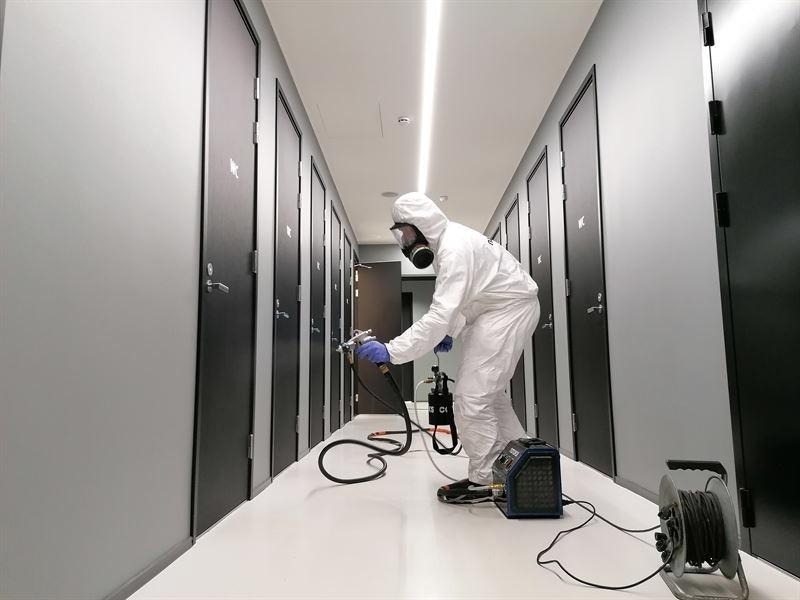A nanotechnology company Nanoksi Finland has introduced a self-disinfecting nanocoating that reduces the number of viruses and bacteria on surfaces and improves indoor air quality. The company’s internationally acclaimed innovation has quickly gained popularity: it is already used in the fight against COVID-19 in thousands of locations across Europe.

Image Credit: Nanoksi Finland
The photocatalytic coating innovated by a Finnish company uses nanotechnology. It has been of significant benefit in combating the coronavirus epidemic, as studies show that coronavirus is transmitted not only as droplet infection but also from surfaces.
The photocatalytic coating, together with normal indoor light, destroys viruses, bacteria, mold spores, and other volatile organic compounds. The coating disinfects the surface when exposed to light. The phenomenon is called photocatalysis.
“In photocatalysis, light is used to initiate a chemical reaction in which the released reactive oxygen species react with and destroy the microbes on the surface. The reaction requires a catalyst, titanium dioxide. The method is also commonly used to purify water and air of various contaminants” says Pasi Keinänen, CEO of Nanoksi, Ph.D. of Engineering.
The coating won international competition over more than a hundred different solutions
Nanoksi Finland's innovation was recently chosen as the winner of the international Aviation X Lab Accelerate competition. 102 solutions from 30 countries took part in the competition, which will increase the wellbeing and safety of tourists during a corona pandemic. The jury selected the Nanoksi solution as the best in the competition as it can be used in many areas from tourism to healthcare and due to its long-lasting effectiveness.
The Aviation X Lab Accelerate is an annual project undertaken by the five global aviation giants Airbus, GE Aviation, Emirates, Thales, and Collins Aerospace, to bring new innovations to the aviation industry. The competition was now open to companies whose COVID-19-related solutions can ensure the wellbeing of tourists throughout the journey.
The aim of the competition was to find innovative, customer-driven ideas to improve aviation health and safety performance and to restore confidence in tourism during and after the pandemic.
The photocatalytic coating will be installed at Dubai Airport
Nanoksi operates in Finland, Sweden, Estonia, the United Kingdom, Sweden, Portugal, France, and Ukraine.
“With the victory in the competition, we are also taking our solutions to the United Arab Emirates. Among others, we will install the coating at Dubai International Airport, which is the third busiest airport in the world. This way, our solution makes traveling safer for more than 86 million people every year,” says Keinänen of Nanoksi Finland.
The virus-killing coating works within a day from installation
The photocatalytic coating can be installed quickly and, when dry, forms an invisible, flexible, and breathable protection on the surface. The coating is activated within a day from starting of the coating work. The photocatalytic coating is suitable for any type of surface material and can be applied to new applications or installed afterward.
“Studies show that the COVID-19 virus survives on different surfaces up to several days. Photocatalysis is very well suited for the continuous disinfection of surfaces without chemicals. In addition to the coating, all that is needed is light,” Keinänen continues.
The coating is also used on properties with indoor air problems
Photocatalytic coatings have been used for years on the exterior surfaces of buildings, such as walls and windows to keep them clean. In addition, the coating is a popular indoor solution where indoor air problems have been identified as the coating, together with light, also cleans the room air.
“Air usually circulates from the center of the room up towards the ceiling and back down along the walls. When indoor air hits a light-receiving catalytic coated surface, the organic compounds that cause problems are destroyed. For this reason, in places with indoor air problems also the ceiling is usually coated in addition to the walls”, Keinänen explains.
Titanium dioxide used in photocatalytic coatings is a non-toxic and safe substance that is commonly used for example in the food industry, paints, toothpaste, sunscreens, and confectionery.